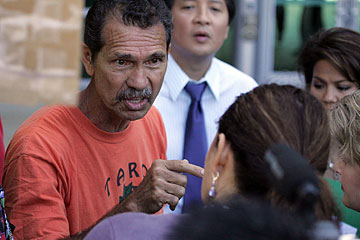
CRAIG T. KOJIMA / CKOJIMA@STARBULLETIN.COM
Protesters chained and padlocked the main entrances to the John A. Burns School of Medicine for about 45 minutes yesterday to protest the University of Hawaii at Manoa's patents on taro. Protest leader Walter Ritte spoke with UH Board of Regents Chairwoman Kitty Lagareta.
|
|
Protesters block medical school
A native Hawaiian group chains and padlocks doors over the taro dispute
Native Hawaiian activists say their protests against the University of Hawaii at Manoa's patents on taro will "escalate" unless the situation is resolved.
Yesterday morning, protesters chained and padlocked the main entrances to the John A. Burns School of Medicine for about 45 minutes while men wearing white malos held kapu sticks to prohibit people from walking in.
The chains were unlocked and the protest ended peacefully when University of Hawaii Board of Regents Chairwoman Kitty Lagareta agreed to respect the kapu against going into the building until 9:30 a.m., a half-hour after the regents meeting was scheduled to start.
Walter Ritte, a leader of the protesters, said kalo, or taro, is sacred to native Hawaiians, who consider the plant one of their ancestors.
Ownership of taro "is like slavery," said Alapai Hanapai, who said it is as if someone owns your relatives.
Hawaiians must protect the taro and the biodiversity of the islands, or they will lose it like they lost their lands, Ritte said.
"It should not be an environment where it is science versus Hawaiians," said UH-Manoa Chancellor Denise Konan.
Konan said the university has been doing research on taro for 100 years and needs to continue doing research to help protect the plant from diseases.
Konan said the faculty contract requires the university to protect the intellectual property rights of its scientists. There are also concerns that if UH drops the patent, a for-profit company or other entity might pick it up.
"We could lose control of ownership," Konan said. "The goal is to find a way to be a good steward of invention."
But Ritte said the issue is simple: The university does not have the right to own Hawaiian taro and should drop the patents.
About 30 people at the protest yesterday included students from different native Hawaiian charter schools and opponents of the proposed Navy University Affiliated Research Center on campus.
Ritte said the protest was scheduled for the Board of Regents meeting because he has been trying since January to get the regents and UH President David McClain to take up the issue.
"We can't get it on their agenda," Ritte said.
McClain said because the research is taking place at UH-Manoa, it is appropriate for the Manoa administration to try and resolve the issue first before bringing any recommendations to his office and the Board of Regents.
Depending on what is decided, the board might not need to get involved, McClain said.
Gary Ostrander, UH-Manoa vice chancellor for research, said the three species of taro patented by the university were created by breeding a Hawaiian taro strain with other varieties of the plant, not through genetic modifications.
Ostrander said native Hawaiian farmers have also approached him and said they support UH research on taro.
Konan said the university has not made any money from the patented taro. She said licensing agreements allow farmers to grow the plant for free for three years, and then they will pay 2 percent of any profits only if the taro is sold.
Ritte, who has already organized two previous protests at the UH-Manoa campus, said they will wait to see what the university does next. "But if we keep getting ignored, we have to speak louder," Ritte said.

